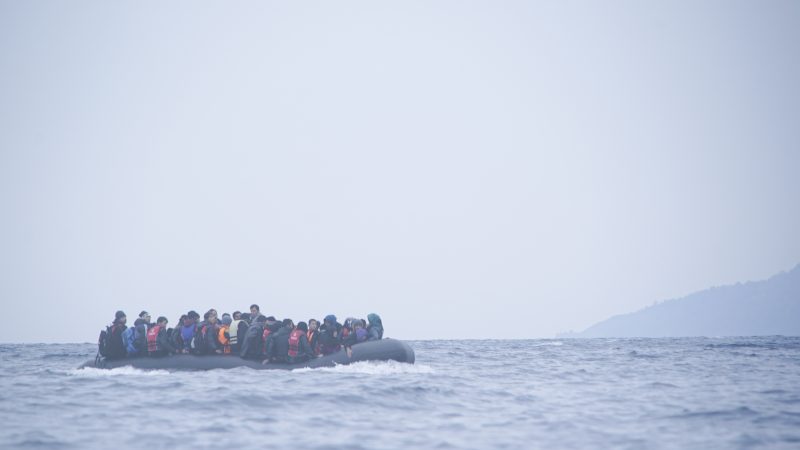In the next fifty years, the climate crisis will force millions of people to flee their homes. In order to survive, we have to build a more compassionate and resilient society.

On Tuesday, we learnt that child refugees would be detained by the Border Force in a migrant “processing centre” – instead of being looked after by the local authority.
It’s part of a disturbing pattern. Last week, Boris Johnson announced that he was considering changing the law in order to deter migrants from crossing the English Channel. The Home Secretary, Priti Patel, put in a formal request to the Ministry of Defence amid claims that the government intended to send in the Royal Navy. The Immigration Minister, Chris Philp, then added to the furore, calling for asylum-seekers to be fingerprinted on arrival and face “real consequences if they try to cross again”.
When it comes to the new ‘processing centre’, the Home Office refused to say if children will be detained beyond the legal limit or the conditions in which they would be kept. They refused to even confirm how many people were being detained. Kent County Council had repeatedly warned the government that they needed national resources in order to care for these children properly. But the government chose not to listen and is instead taking a far more dangerous and draconian approach.
Thankfully, many of the other plans have had to be abandoned. The government eventually had to row back from plans to use warships in the Channel after human rights groups advised them that doing so might be illegal. The UN Refugee Agency also intervened. They warned that the action the UK Government were considering could cause “fatal incidents” and reminded politicians that “saving lives should be the first priority”.
But this was never really about warships. It was all about rhetoric. About being seen to be tough on migration. If the United Kingdom genuinely wanted to find a solution to this tragic situation, then they would set up a safe route for refugees to claim asylum. They could, for example, set up a humanitarian visa system or start processing asylum claims in Calais.
Instead, they have decided to make the situation worse. They have chosen to whip up fear of a foreign “invasion” when, in reality, the people who are making these crossings are desperate people, fleeing war and violence, that need our help and our solidarity.
Any attempt to stop people from peacefully seeking asylum is a violation of their fundamental human rights. Anyone that would have you believe otherwise, or that deliberately downplays the human tragedy that is at the heart of this debate, has a far more sinister agenda.
Indeed, it is impossible to know how many people have died crossing the Channel. In the last few years, thousands of people have died crossing from Libya to Italy. When they arrive in Europe, they face violence and hostility. Refugees have had their tents slashed and their camps gassed. They have been beaten up at night, arrested, trafficked, exploited, and killed.
In January, a Sudanese man was found dead in a lake in Calais. In March, a child died on the railway tracks as he tried to get to England. Last year, countless people were found dead. Many drowned, others starved to death. Some committed suicide. The media consistently fail to report these facts or to provide balanced and responsible coverage.
Nobody makes this journey unless they absolutely have to. We must never forget that. We should be welcoming these people with open arms and doing everything in our power to give them justice. After all, we are, in no small part, responsible for much of their hardship. We need to place these migrations in context; that means looking at how the United Kingdom has played a role in destabilising the regions from which they have fled. But it also means looking to the future, and understanding these migrations as one part of a much larger crisis.
In the years to come, we will see many more refugees. As more migrants are displaced because of war, violence, and the ongoing effects of the climate crisis, we are going to have to do everything in our power to resist the racist narratives that now permeate every part of our culture, and strip so many people of their basic humanity. The majority of displaced people live in regions that we have invaded in the past or regions in which our military personnel are still present. We are, in part, responsible for many of these journeys.
So we must now do all we can to stop climate and ecological catastrophe. We have to decarbonise at pace and degrow the economy. But, at the same time, we need to accept that some aspects of the climate and ecological emergency are playing out now.
We need a labour movement that stands up for refugees and defends human rights. Because if we choose to say nothing, we will be complicit in the tragedy to come.
Sam Knights sits on the committee of the Labour Campaign for Human Rights.
To reach hundreds of thousands of new readers and to make the biggest impact we can in the next general election, we need to grow our donor base substantially.
That's why in 2024, we are seeking to generate 150 additional regular donors to support Left Foot Forward's work.
We still need another 124 people to donate to hit the target. You can help. Donate today.



